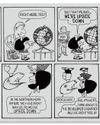Prøve GULL - Gratis
DO NO HARM
The New Yorker
|January 22, 2024
Oregon tried a more humane way to address addiction. Then came the backlash.

In the early months of the pandemic, joggers on the Bear Creek Greenway, in southern Oregon, began to notice tents cropping up by the path. The Greenway, which connects towns and parks along a tributary of the Rogue River, was beloved for its wetlands and for stands of oaks that attracted migrating birds. Now, as jobs disappeared and services for the poor shut down, it was increasingly a last-ditch place to live. Tents accumulated in messy clusters, where people sometimes smoked fentanyl, and “the Greenway” became a byword for homelessness and drug use. On a popular local Facebook page, one typical comment read, “Though I feel sorry for some of the people in that situation, most of them are just pigs.” In Medford, the largest city along the trail, police demolished encampments and ticketed people for sleeping rough.
One September evening in Medford, a white cargo van belonging to a nonprofit called Stabbin Wagon parked near the Greenway, between an auto-repair shop and a Wendy’s. For unhoused people across Oregon, cargo vans have become a symbol of help. Some contain primary-care clinics and food pantries. Others, like Stabbin Wagon’s, distribute a more controversial kind of aid: safe supplies for drug users.
Stabbin Wagon’s director, Melissa Jones, pulsed with nervous energy, and wore flip-flops and a T-shirt that read “Nothing ends homelessness like housing.” With her was Samantha Strong, a young activist with a green buzz cut and piercings. The two women—Stabbin Wagon’s only employees—opened the van’s doors to reveal plastic bins and hanging compartments of inventory, neatly arranged and all free. There were boxes of naloxone, needles of various gauges, cookers, pipes, fentanyl test strips, soap, and hand sanitizer.
Denne historien er fra January 22, 2024-utgaven av The New Yorker.
Abonner på Magzter GOLD for å få tilgang til tusenvis av kuraterte premiumhistorier og over 9000 magasiner og aviser.
Allerede abonnent? Logg på
FLERE HISTORIER FRA The New Yorker

The New Yorker
THE MAGIC OF “MAFALDA”
How an Argentinean comic strip became an international phenomenon.
11 mins
July 07 - 14, 2025 (Double Issue)

The New Yorker
BY THE BOOK
What we learn from reading the fiction touted in our début issue.
13 mins
July 07 - 14, 2025 (Double Issue)

The New Yorker
THE STORY PART
Student days and a search for community.
19 mins
July 07 - 14, 2025 (Double Issue)

The New Yorker
THE SILENCE
A great silence opened up inside her. But that made it sound more dramatic than it was. It happened by degrees, creeping up slyly. And at times, in certain places and situations, it was expected and welcome—on a long walk, or when a person confessed something pitiful, or at a funeral or a party. In all those places, where once she'd had a lot to say—too much, honestly—now there was this silence and she became a far better listener. Not consciously, that was just one of the consequences. It wasn't a Zen silence or an enlightened silence or anything she'd worked to achieve. It was only a sort of blank. Once, on a mini-break, she'd spotted a sentence graffitied on a bridge in Paris: “The world is everything that is the case.” (It was written in English and stuck in her mind.) The silence felt like that: it spoke for itself. But it could also offend and disappoint others, the same way the world itself never seems enough for some people. It was no use on big family occasions, for example, or when one of her adult daughters called her name from another room, or if someone at work asked for her view on the news of the day. It could make other people feel awkward. But when she was alone with it, whenever it coincided with her own long-standing habit of looking upward into the branches of trees—then it didn't really bother her at all.
23 mins
July 07 - 14, 2025 (Double Issue)

The New Yorker
THE COMEDIAN
My father worked nights as the desk attendant at a cheap hotel downtown. It was a thankless job behind bulletproof glass, which was all he had to shield him from demented drunks and screeching prostitutes, from seven in the evening until four in the morning, the poor man.
24 mins
July 07 - 14, 2025 (Double Issue)

The New Yorker
IS IT THE PHONES?
The tantalizing power of the theory that screens are harming teens.
13 mins
July 07 - 14, 2025 (Double Issue)

The New Yorker
THE END OF THE ESSAY
What comes after A.I. has destroyed college writing?
25 mins
July 07 - 14, 2025 (Double Issue)

The New Yorker
EASY MUSIC
How Elmore Leonard perfected his style.
23 mins
July 07 - 14, 2025 (Double Issue)

The New Yorker
JUBILEE
A wooden ruler with the etched faces of Henry VIII's six wives running down the middle; ticket stubs from Hampton Court and the Chamber of Horrors, where we walked ahead of our mothers, hand in hand; a few wrappers of Dairy Milk.
34 mins
July 07 - 14, 2025 (Double Issue)

The New Yorker
PRIDE AND PROVENANCE
The Met's new Rockefeller Wing daxxles—and whispers, “Finders, keepers.”
6 mins
July 07 - 14, 2025 (Double Issue)
